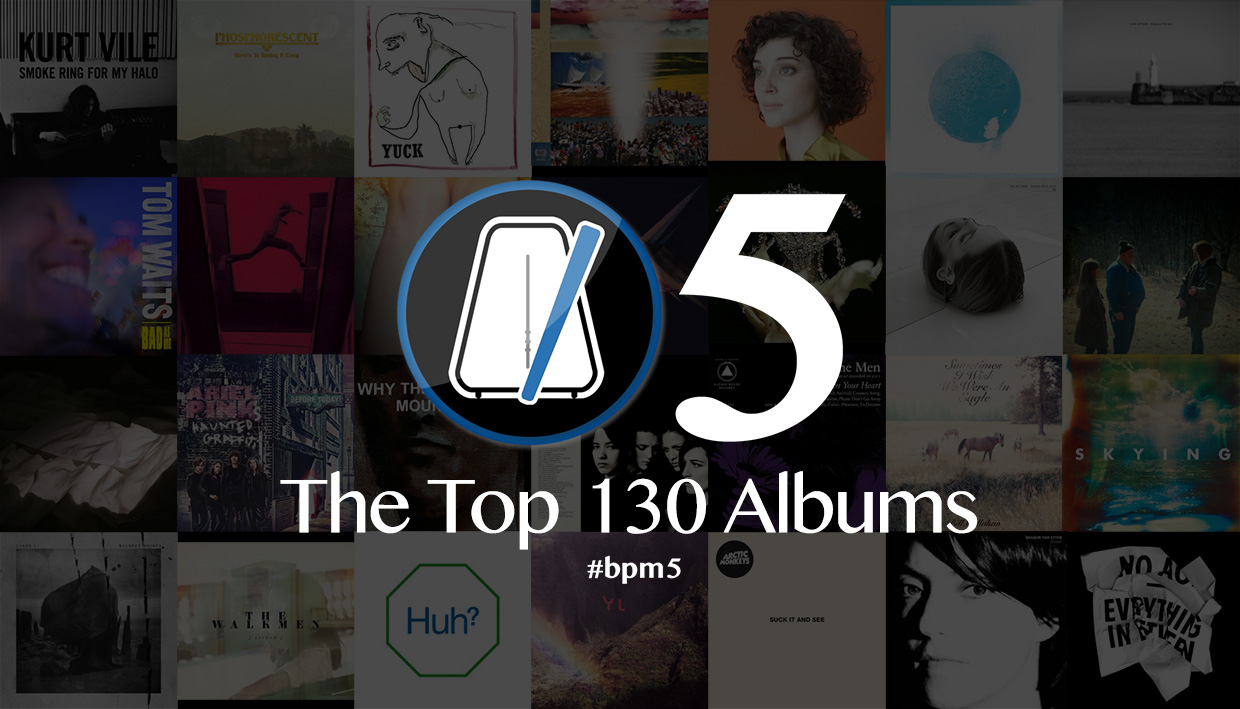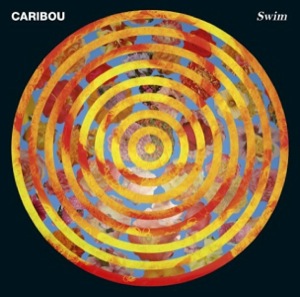
50
Caribou
Swim
[Merge; 2010]
Dan Snaith is constantly evolving his music, from Manitoba into Caribou, and even from album to album, but the change from 2007’s Andorra to 2010’s Swim was more or less a complete overhaul. Gone were the dorky glasses of the PhD student and his newly unbespectacled eyes were planted firmly on the dancefloor. Swim is an album that stands up on its rich and chunky bass throbs, while there’s the continued use of live instrumentation such as chimes, guitars, analogue synths, multiple layers of rattling and clicking percussion, squalls of saxophone and so much more going on that it’s hard to pin down. Snaith’s voice is less of a focal point as well, blending in as just another layer in the storm. It’s at its most noticeable when it’s singing a simplistic hook like “Sun” or “Leave House”’s titular repetitions that remain spinning around in a whirlpool in your head throughout. All this gives Swim a wild level of exuberance, and leaves you wanting to both dance and appreciate its sonic lavishness simultaneously. Whereas previous Caribou efforts felt laden with emotion and instrumentation, Swim was more about fun, and creating something that sounded more simplistic and primal. Each song has moments of utter glee, and it’s almost as if Snaith had discovered that he could use his mathematical expertise combined with dance music’s rhythmic formula to determine precise ways and points to make listeners squeal with delight in each song. Watching his live band build up and aggrandize these songs in a live setting is truly a joy to behold too.
– Rob Hakimian
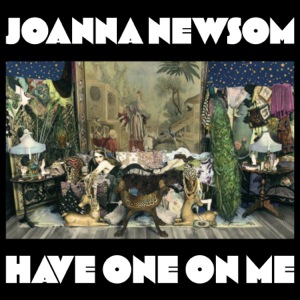
49
Joanna Newsom
Have One On Me
[Drag City; 2010]
Joanna Newsom doesn’t do anything in half measures, and certainly her ambition could never be called into question. Her intricately composed harp-centered folk musings feel grounded in Renaissance times, where story songs and wildly archaic wording were the norm and not the exception. On her 2010 3-disc masterpiece, Have One On Me, Newsom took the blueprint of her previous records and, by adding deeper layers of instrumentation, has managed to deepen the emotional connection between the listener and her often wonderfully antiquated narratives. But despite the fey superficiality of the music, there is an emotional heft that never allows these songs to simply dissolve away into some ghostly musical ether.
Newsom has a singular gift for storytelling, and she uses it in service of the often fantastical landscapes that populate Have One On Me. Unfurling each track one musical strand at a time, she lays bare the songs’ base structure and allows us a brief glimpse of the creative process involved in the creation of her music. All her records have been cohesive statements of the viability of folk music in modern music, but with Have One On Me, she has recorded an album of dense genre conceptualization that puts to rest any notion of her being musically contrary for its own sake. Her detailed descriptions and florid prose create windows into vast networks of interrelated stories, and she is kind enough to leave one open on occasion.
– Josh Pickard
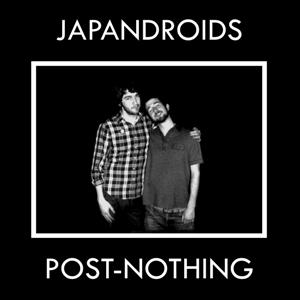
48
Japandroids
Post-Nothing
[Polyvinyl; 2009]
If you’re fighting the urge to escape from your hometown, stewing in the fear associated with actually doing so, splicing memories together from blurry nights, forging or dissolving friendships, Post-Nothing isn’t so much a listening experience as a right of passage. Japandroids were barely writing songs at this point, but it’s hard to argue with how well they conveyed the emotions linked with the restlessness of youth. From the goofy moments to the weighty ones, the sincerity of this record rings out with every fuzzed-out decibel. The pivotal moment comes on “Young Hearts Spark Fire,” when Brian King and David Prowse yell “I don’t wanna worry about dying/ I just wanna worry about those sunshine girls.” It’s airtight logic if you’re 19, exhilarating music even if you’re not. As infectious as garage rock gets, Post-Nothing rejoices in living life and laughs at the absurdity of death with invigorating, beautiful bluster.
– Brendan Frank
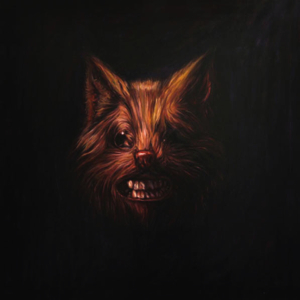
47
Swans
The Seer
[Young God; 2012]
Since the initial end of the band in 1997 and revival in 2010, The Seer is the biggest thing Swans has created and it also marks one of the most important phases in Michael Gira’s career. In the announcement of the record, Gira described it The Seer as “the culmination of every previous Swans album as well as any other music I’ve ever made, been involved in or imagined.” When it came to the subject of Swans, that was already an extremely lofty statement. The entire conception of this record is entirely interesting, from funding it through their live album We Rose From Your Bed With The Sun In Our Head (as well as Gira’s own money) to the constant building onto songs until they were twenty-minute-plus colossi. Music this enormous does not get made over the course of a couple Paul McCartney/John Lennon 15-minute writing sessions–it came with a dedication unique to Gira and company, as well as months of patience and controlled looseness on-stage and in-studio.
– Andrew Halverson

46
Real Estate
Days
[Domino; 2011]
Warning! Bold Claim Ahead: two years to the day and, nope, this hasn’t been topped by any indie release. When it dropped, a few culture vultures quipped that the Jersey boys had missed an open goal by pushing Days out after a summer that saw many inferior records casually float down the hype stream. Sure, the harmonised hushes, breezy melodies and Matt Mondanile’s distinctive jangle go down incredibly well on a warm poolside porch, but it fits equally well as a leaves-turning record. There’s a palpable sadness at the heart of some of these tracks, however spry they may initially seem; a boxed-off intimacy amongst the fireside glow. But this isn’t an overtly complex set by any means. On the contrary, Real Estate’s coup on their sophomore effort was how quickly it settles, affording immense and faintly unlikely sticking power to a band that were pegged as a bit-part player in a consciously unhurried scene.
I checked on more than one occasion to see if “Wonder Years” was a cover, adamant that this was a song I had grown up with, embedded deep within my DNA. Taken as a 40m package it rarely deviates from the formula — 1: Make A Near-Flawless Record, 2: Chill. — but there are some real capital-M Moments nestled away too: “It’s Real” bearing down and kicking into fifth gear, the bent notes on “Kinder Blumen”, “All The Same”‘s closing coda (a track I’d gladly let stretch out for hours), the rotund bass plodding along next to the shimmering riff on “Municipality” before the playful piano slopes in and out of view. It is a serious accomplishment, shaping what could be critiqued as a little dull into a record that people have come to celebrate and legitimately believe in, but simultaneously retaining an underrated status. It is every bit as good as On Fire or Murmur; a classic, whichever way you spin it.
– Gabriel Szatan

45
The Flaming Lips
Embryonic
[Warner Bros.; 2009]
Embryonic reset the clock for The Flaming Lips. After a decade of functioning as a studio three-piece and turning out highly orchestrated albums with Wayne’s voice and lyrics firmly in the foreground, the band had gone back to being a band again. It would be easy to imagine that a back-to-basics approach would result in an album that sounded like it could be the follow-up to 1993’s Transmissions From The Satellite Heart, but this is The Flaming Lips. They’re anything but predictable, although they probably needed to remind themselves of that after the relatively tame At War With The Mystics.
Constructing songs primarily upon a tapestry of drum and bass patterns, Embryonic was also their first so-called double album, even though it fits on a single disc and doesn’t run much longer than some of their previous records. Like The Rolling Stones’ Exile On Main Street, the record goes for a sustained mood over individual songs. Which is not to say there aren’t some gems on here. Embryonic takes you on an organic journey through a range of styles including free jazz and psychedelia, and because the vocals are pushed to the back, the themes of power and astrology only emerge over time. But on a sprawling record like this, uncovering the rewards is what it’s all about.
– Todd Norem
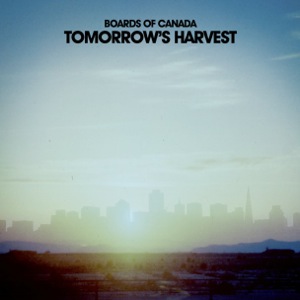
44
Boards Of Canada
Tomorrow’s Harvest
[Warp; 2013]
It’s always a thrill when a group returns from a lengthy hiatus and manages to pick up exactly where they left off. It’s also extremely rare. Tomorrow’s Harvest is an entry in a club with very few members — Portishead’s Third and Godspeed You! Black Emperor’s ‘Allelujah! Don’t Bend! Ascend! chief among them. Truth be told, if Boards of Canada had never returned to the studio again, they’d still be the creators of two classic electronic works and would leave behind a legacy of indisputable importance. But much like Third and ‘Allelujah! Don’t Bend! Ascend!, Tomorrow’s Harvest is much more than an extra in an artistic endeavour already fully-realized – it’s also a thrilling evolution. The band has never crafted a more perfect balance of the often unsettling, occult-influenced drone that’s become their signature with an almost operatic beauty throughout the album’s 17 tracks. Tomorrow’s Harvest is the perfect soundtrack to the apocalypse – a final, unencumbered look at a breathtaking sunset before the bombs finally drop and destroy it all.
– Cole Zercoe
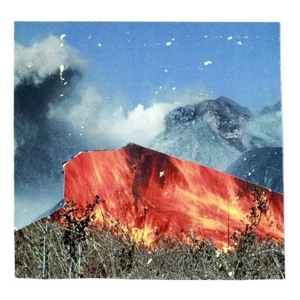
43
WU LYF
Go Tell Fire To Mountain
[LYF; 2011]
WU LYF crept out of antagonistic anonymity in 2010 with “Heavy Pop” and less than a year after their debut, Go Tell Fire To The Mountain, they disbanded. The record felt like the desperate, earnest manifesto from a group that wasn’t sure if it could remain in a world that didn’t live up to their lofty expectations. Or a world where they themselves couldn’t rise to that level. The irreverent, sarcastic stage banter of their live shows was always at odds with the atmosphere of exceedingly sincere togetherness their music engendered. Go Tell Fire To The Mountain is one long choked, passionate cry for brotherhood and unity in a world laden with loss, sadness, and heartbreak. The album somehow melded the clenched energy of hardcore and the religiosity (and church organ) of gospel, with the shimmering, expansive beauty and grandiosity of post-rock. The band’s realm was transcendence, Ellery Roberts’ vocals like a man screaming out his last words on the way to death in bursts of almost uncomfortably raw emotion. WU LYF held nothing back.
– Will Ryan
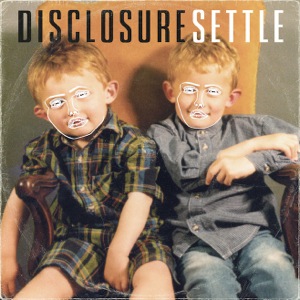
42
Disclosure
Settle
[Island; 2013]
It’s rare for an artist or band to get everything right on their debut — either some aspect of their musical approach seems to be a bit underdeveloped or lyrically they’re just not where they need to be (or a dozen other reasons). So it often feels like a bit of a surprise when you find a record, a debut even, where everything just works. Though for UK electronic duo Disclosure, getting everything right seems to come very naturally. Their debut, Settle, feels like a rapturous descent into the inner heart of dance music, where UK garage and bass-heavy club rhythms meet and cavort alongside gossamer pop melodies and strikingly intricate instrumentation. Disclosure didn’t set out to rearrange the face of dance music, but they’re doing a hell of a job nonetheless.
And as backward looking as they are acutely aware of the need for innovation in a genre that often relies on thudding beats to cover over for a lack of originality, the brothers – Howard and Guy Lawrence – behind Disclosure aim for an amalgamation of the past and present, of form and function broken up against modernism and experimentation. Tossing off allusions to grime, house, and straight-’90s techno, they chop and twist their influences into something completely original, yet still reverent to the source material. And if tracks like the Eric Thomas-sampling “When A Fire Starts To Burn” or the Jessie Ware collaboration “Confess To Me” aren’t enough to convince you of the debt that dance music now owes to Disclosure, the rest of the tracks on Settle should leave absolutely no doubt in your mind.
– Josh Pickard
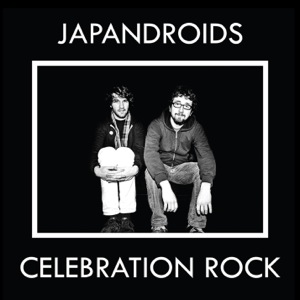
41
Japandroids
Celebration Rock
[Polyvinyl; 2012]
Celebration Rock is one of the most aptly titled albums you can find – it’s a celebration of youth, excitement and rock ‘n’ roll. The second LP from Vancouver’s Japandroids finds the noise rock duo moving far beyond their 2009 debut Post-Nothing. The band have cleared up the production and Celebration Rock sounds positively bombastic, perhaps losing a bit of subtlety but gaining a stadium sized sound fit for their anthemic songwriting.
It’s a mix of The Replacements, Bruce Springsteen, The Hold Steady and noise rock tailor-made for festivals as well as sweaty rock clubs – the type of music that just makes you want to drink beer, jump around and scream out loud. Lead single “The House That Heaven Built” and “Younger Us” (released as a stand-alone 7” the year before) are prime examples of this – the rest of the album is packed with possible singles as well – and while Japandroids are far from subtle, they’re way too much fun for that to make any difference.
– Johan Alm

